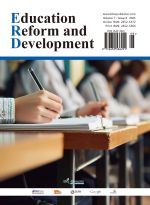Innovative Pathways for the Development of Dual-Carbon Disciplines at the Xiong’an Campus Based on Carbon Neutrality Practices
Abstract
In the new era, against the macro background of new productive forces, the higher education system, especially the practices of carbon-neutral talent development, is undergoing a profound supply-side structural reform. This paper conducts mixed-methods research focusing on policy orientation, case analysis, and quantitative statistics to systematically deconstruct the innovative mechanisms underlying the development of carbon neutrality disciplines. The study reveals that the innovation model for dual-carbon discipline construction in universities is centered on three key pillars: the reconstruction of a “technology-economy-policy” ternary knowledge network, the integration of innovation chains through a five-dimensional collaborative mechanism of “government-industry-academia-research-application,” and the reshaping of training systems based on a “micro-major-project-based-dual-mentorship” model. Drawing on a tracking study of 37 pilot universities, the empirical results of the innovation triangle model, along with the practical challenges faced in dual-carbon discipline construction, have led to the proposal of a three-stage policy framework encompassing “institutional breakthrough-resource restructuring-ecological evolution.” This framework provides significant guidance for universities in constructing dual-carbon disciplines and carbon neutrality talent development at their Xiong’an campuses. Also, this paper offers theoretical support and practical paradigms for higher education to serve the national dual-carbon strategy.
References
The State Council of the People’s Republic of China, 2021, Opinions of the Central Committee of the Communist Party of China and the State Council on Fully, Accurately, and Comprehensively Implementing the New Development Philosophy to Achieve Carbon Peaking and Carbon Neutrality, visited on October 26, 2024, https://www.gov.cn/zhengce/2021-10/24/content_5644613.htm
Ministry of Science and Technology, National Development and Reform Commission, Ministry of Industry and Information Technology, Ministry of Ecology and Environment, Ministry of Housing and Urban-Rural Development, Ministry of Transport, Chinese Academy of Sciences, Chinese Academy of Engineering, National Energy Administration, 2022, Implementation Plan for Science and Technology to Support Carbon Peak and Carbon Neutrality (2022–2030): Document No. 157 (2022) of MOST, visited on December 26, 2024, https://www.gov.cn/zhengce/zhengceku/2022-08/18/content_5705865.htm
Li R, Dong C, 2024, Developing Talent for Carbon Peak and Carbon Neutrality: Strategies Under the “Dual-Carbon” Goals. China Petroleum Enterprise, 2024(10): 117–120.
Xue Z, Tan X, He P, 2024, Talent Cultivation and Recruitment Strategies for Carbon Peak and Carbon Neutrality in the European Union and Their Implications. China Talent, 2024(11): 58–59.
Carbon Peaking and Carbon Neutrality Working Group of Alliance of Industrial Internet and the Green Development Committee of Internet Society of China, 2025, Blue Book on Carbon Peak and Carbon Neutrality (2025). Internet Society of China, visited on March 25, 2025, https://www.isc.org.cn/profile/2025/03/21/2ba4d55a-440c-422e-a0df-85e35c61d757.pdf
The State Council of the People’s Republic of China, 2024, Outline for Building a Leading Education Nation (2024–2035), visited on January 19, 2025, https://www.gov.cn/zhengce/202501/content_6999913.htm
Song J, 2021, Exploring and Practicing a Research Evaluation System Based on Disciplinary Characteristics and Quality Contributions: A Case Study of Communication University of China. China University Science & Technology, 2021(S1): 49–51.
Qian X, Peng Y, Sun J, 2025, Innovative Talent Cultivation and Evaluation Model for the “Dual-Carbon” Strategy: A Case Study of the School of Mechanical Engineering at Yanshan University. Innovation and Entrepreneurship Theory Research and Practice, 8(5): 127–130 + 144.
Wang Z, 2024, Reflection and Improvement of University Discipline Evaluation Mechanism from the Perspective of Dual-Carbon Talent Cultivation. Jiangsu Higher Education, 2024(2): 52–59.
Zhang Y, 2019, What Kind of Discipline Evaluation Does “Double First-Class” Construction Need: Reflections Based on Meta-Evaluation of Discipline Assessment. Tsinghua Journal of Education, 40(5): 11–18.
Cui Y, Li J, Zhang S, 2022, Interdisciplinary Discipline Construction: Connotation Analysis, Implementation Dilemmas and Promotion Strategies. China Higher Education Research, 2022(4): 16–22.
Li Z, Jing H, Zhou T, Liu B, 2022, Exploration of Innovative Talent Cultivation Paths in Carbon Neutrality Field Under the “Dual-Carbon” Vision. Future and Development, 46(7): 83–86.
Wang Q, Li P, Zhou J, et al., 2025, Interdisciplinary Approach Promotes High-Level Innovative Talent Cultivation: A Case Study of Tsinghua University’s Carbon Neutrality Capability Enhancement Program. Academic Degrees & Graduate Education, 2025(03): 32–38.
Huang Z, Jia M, Liu H, 2021, Exploration of Establishing “Low-Carbon Science and Management” Programs in Universities Under Dual-Carbon Goals. New Liberal Arts Education Research, 2021(4): 60–73 + 142–143.
Wang J, Zhao K, 2024, Low-Carbon Interdisciplinary Construction Under the “3060” Strategy: Status, Experiences, and Recommendations. Review of Higher Education, 2024(2): 9–16.
Li K, Sun F, Chen L, 2024, Logical Analysis and Countermeasure Research on the Establishment of Dual-Carbon Management Programs. Jiangsu Commercial Forum, 2024(10): 131–137.

